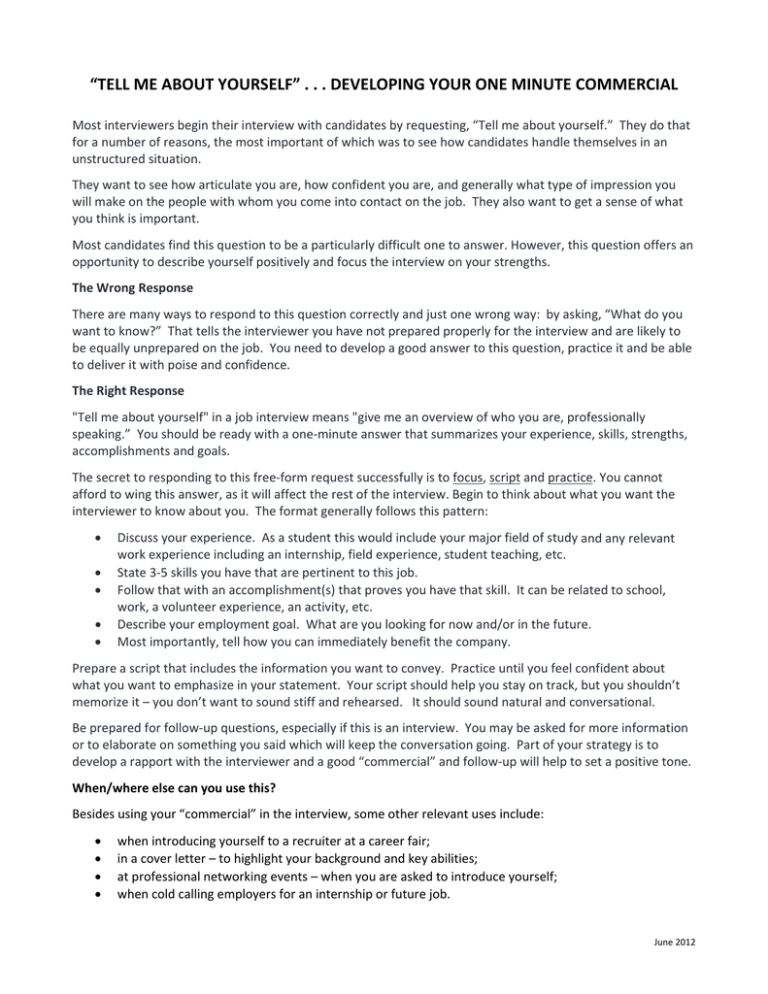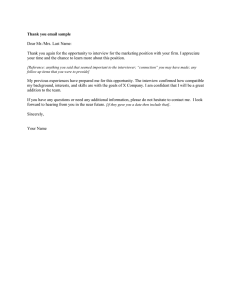Ace the Interview: Tell Me About Yourself Guide
advertisement

“TELL ME ABOUT YOURSELF” . . . DEVELOPING YOUR ONE MINUTE COMMERCIAL Most interviewers begin their interview with candidates by requesting, “Tell me about yourself.” They do that for a number of reasons, the most important of which was to see how candidates handle themselves in an unstructured situation. They want to see how articulate you are, how confident you are, and generally what type of impression you will make on the people with whom you come into contact on the job. They also want to get a sense of what you think is important. Most candidates find this question to be a particularly difficult one to answer. However, this question offers an opportunity to describe yourself positively and focus the interview on your strengths. The Wrong Response There are many ways to respond to this question correctly and just one wrong way: by asking, “What do you want to know?” That tells the interviewer you have not prepared properly for the interview and are likely to be equally unprepared on the job. You need to develop a good answer to this question, practice it and be able to deliver it with poise and confidence. The Right Response "Tell me about yourself" in a job interview means "give me an overview of who you are, professionally speaking.” You should be ready with a one‐minute answer that summarizes your experience, skills, strengths, accomplishments and goals. The secret to responding to this free‐form request successfully is to focus, script and practice. You cannot afford to wing this answer, as it will affect the rest of the interview. Begin to think about what you want the interviewer to know about you. The format generally follows this pattern: • • • • • Discuss your experience. As a student this would include your major field of study and any relevant work experience including an internship, field experience, student teaching, etc. State 3‐5 skills you have that are pertinent to this job. Follow that with an accomplishment(s) that proves you have that skill. It can be related to school, work, a volunteer experience, an activity, etc. Describe your employment goal. What are you looking for now and/or in the future. Most importantly, tell how you can immediately benefit the company. Prepare a script that includes the information you want to convey. Practice until you feel confident about what you want to emphasize in your statement. Your script should help you stay on track, but you shouldn’t memorize it – you don’t want to sound stiff and rehearsed. It should sound natural and conversational. Be prepared for follow‐up questions, especially if this is an interview. You may be asked for more information or to elaborate on something you said which will keep the conversation going. Part of your strategy is to develop a rapport with the interviewer and a good “commercial” and follow‐up will help to set a positive tone. When/where else can you use this? Besides using your “commercial” in the interview, some other relevant uses include: • • • • when introducing yourself to a recruiter at a career fair; in a cover letter – to highlight your background and key abilities; at professional networking events – when you are asked to introduce yourself; when cold calling employers for an internship or future job. June 2012
